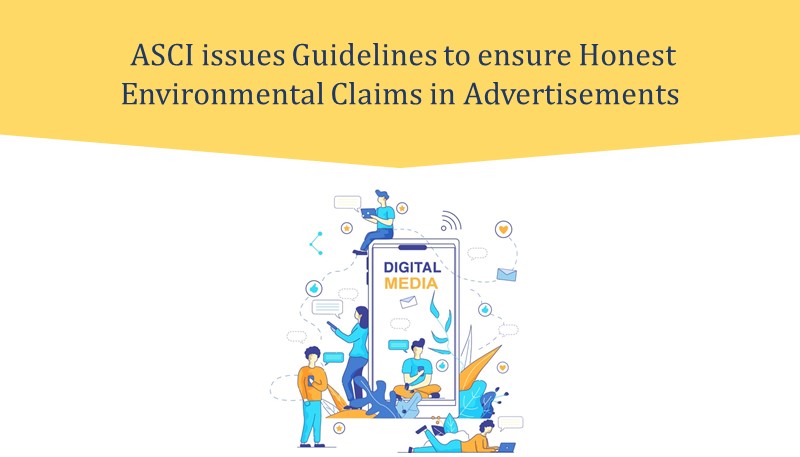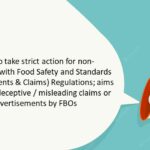The Advertising Standards Council of India (“ASCI”) has issued “Guidelines for Advertisements Making Environmental/ Green Claims”, to prevent false pro-environment claims, also known as greenwashing*. These guidelines aim to ensure that environmental claims made by advertisers are reliable, verifiable, and transparent. The Guidelines will come into effect from 15th February, 2024.
Key takeaways of the Guidelines:
- The ASCI guidelines require advertisements to make specific claims limited to the part of the product or service that has the environmental benefit.
- Absolute Claims (such as “environment friendly”, “eco-friendly”, “sustainable”, “planet friendly” which implies that the entire product advertised has no impact or only a positive impact, or reduces adverse impact) must be capable of being substantiated by robust data and credible accreditations. Such absolute claims cannot be diluted by a disclaimer or any other clarificatory mechanism such as a QR code or website link etc.
- Comparative claims (such as “Greener” or “Friendlier”) will require evidence for the advertised product or service which provides an environmental benefit over advertiser’s previous product or service or competitor products or services, basis of comparison must be clear.
- General Environmental claim must be claimed on the full life cycle of the product or service advertised, with clear limits of the life cycle. If the claim cannot be justified, then a limited claim about specific aspects of a product or service might be justifiable. Consumers should not be misled on the product or service’s total environmental impact for claims made on part of an advertised product or service’s life cycle.
- The environmental claim, if not clear from the context of the advertisement must specify whether it refers to the product, the product’s packaging, a service, or just a portion of the product, package, or service.
- Consumers must not be misled from advertisements about the environmental benefit that a product or service offers by highlighting the absence of an environmentally damaging ingredient if the ingredient is not usually found in competing products or services. The guidelines also provides that the advertisements must not claim an environmental benefit that results from a legal obligation if competing products are subject to the same requirements. Equip the consumers with relevant information for ‘free-of’ claim by adding appropriate disclaimer to indicate the purpose e.g. “XX-Free: (Names of regulation) prohibit the use of (name of prohibited substance/ingredient) in (category of products)”. It will be a deceptive “free-of” claim if a product is free of one substance but includes another that is known to pose a similar or higher environmental risk.
- Where the consumers have an impression of an environmental claim from use of Certifications or Seals of Approval, the advertiser must clearly mention that on what attributes of the product or service has been evaluated by the certifier. The advertiser must make sure that the certifying agency is nationally/internationally accredited by a certifying authority e.g. agency accredited by the UN council/committee, BIS etc.
- An Advertiser must not use visual elements in the advertisement which may result in conveying a false impression that the product is less harmful or more beneficial to the environment. Eg- logos representing a recycling process on packaging and/or in advertising material can significantly influence a consumer’s impression of the environmental impact of a product or service. The visual elements must not include the colour scheme related to nature or environment or images of natural ingredients or natural elements used on the products / packaging / services as a part of its creative brand identity or trademark/tradename unless such elements used are connected directly to any Environmental Claim made which influences a consumer’s impression of the environmental impact of a product or service.
- Advertisers must refrain from making aspirational claims on the products/packaging/services about future environmental objectives unless they have developed clear and actionable plans detailing how those objectives will be achieved.
- The advertisers must clearly and prominently disclose the carbon offset claims if the offset does not occur within the next two years. Advertisements must not directly or by implication claim that a carbon offset represents an emission reduction if the reduction, or the activity that caused the reduction.
- All claims pertaining to products being compostable, biodegradable, recyclable, nontoxic, free-of etc. advertisers must qualify the aspects to which the claims are attributed. The claims must have competent and reliable scientific evidence to show that:
-
- The product or the qualified component where applicable will break down within a reasonably short period of time after customary disposal.
- The product is free of elements that can lead to environmental hazards.
_______________
*Greenwashing refers to unsubstantiated, false, deceptive, or misleading environmental claims about products, services, processes, brands or operations as a whole or claims that omit or hide information, to give the impression that they are less harmful or more beneficial to the environment than they actually are.
Please refer to the hyperlink below for a detailed read.
Source: The Advertising Standards Council of India





